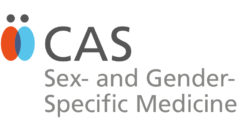Date: 3 – 4 December 2025
Place: Zurich
Language: English
Registration single module: Registration
Fee: two-day module CHF 500, single-day booking CHF 280
Credits:
1 ECTS point two-day module
CME points applied for “Schweizerische Gesellschaft für Pharmazeutische Medizin”
FPH points applied for “Fachgesellschaft FPH Offizin”
FPH points applied for “Spitalpharmazie” and “Klinische Pharmazie” “Fachgesellschaft Spitalpharmazie und klinische Pharmazie”
CME points applied for “Swiss Society for Anaesthesiology and Perioperative Medicine”
Objectives of the module
Participants
- understand how connections between sex, sex hormones and age affect drug actions and they will be able to explain how sex differences in pharmacokinetics and pharmacodynamics modulate drug effects.
- know the central aspects of pharmaceutical therapy in pregnancy and during breastfeeding.
- know about sex and gender differences in the effects and side effects of important cardiovascular drugs.
- know about sex- and gender-specific therapy with propofol, morphine, muscle relaxants and opioids.
- are familiar with the gender-specific management of patients in intensive care, general aspects, including multimorbidity, and the most common intensive care disorders in women and men.
- are familiar with gender-specific guidelines in drug development and are aware of the gaps in knowledge.
Content of the module
This module teaches important differences between women and men in drug therapy, in selected areas of anaesthesia and intensive care medicine. The participants learn to take these into account in their daily work.
In concrete terms, the module comprises the following blocks:
- In general pharmacology we will teach the students how sex differences in pharmacokinetics influence the metabolism and the distribution of drugs. We discuss how interactions with sex hormones affect drug metabolism. We explain how sex differences in pharmacodynamics arise and how they affect the actions of drug. (VRZ)
- In the section on pharmacogenetics sex-specific differences will be complemented with an overview over the impact of genetic variability in drug metabolism, transport and mechanism of action on drug effectiveness and the risk of adverse drug reactions. In particular, polymorphisms in drug metabolizing enzymes like cytochromes P450 and examples of clinically relevant pharmacogenetic effects in oncology will be shown. Open questions related to the combined impact of sex and genetic polymorphisms on drug pharmacokinetics and pharmacodynamics will be discussed. (UA)
- In perinatal pharmacology, pharmacotherapy in pregnancy and during breastfeeding is presented. It is based on the physiological changes (incl. complaints) of the maternal organism associated with pregnancy and the possible effects on drug metabolism (pharmacokinetics and dynamics) as well as the resulting necessary adjustments, e.g. dosage. In addition, an understanding of how the potential effects of drug therapy on the unborn or breastfed child are assessed and why the risk/benefit principle is applied. We also discuss which approaches to characterise drugs in pregnancy and breastfeeding are currently followed and in which direction they should go (including draft legislation). (UvM)
- In cardiovascular pharmacology we explain sex differences in effects and adverse effects of well known drugs, such as ACEI, beta blockers, antiarrhythmics, digitalis and others. It will be discussed whether women or men may need lower or higher doses or closer surveillance. (VRZ)
- We will comment on the influence of sex and gender on drug prescription, adherence and compliance, on self medication and over the counter drugs. Gender related drug therapy in the elderly is also explained. (VRZ)
- The lectures on drug development discusses inclusion of female and male animals in drug development, advantages and disadvantages and the inclusion of women and men in clinical trials. ICH guidelines and their impact. (VRZ)
- In anesthesia we will focus on sex specific effects of propofol, morphine, muscle relaxants, opioids and impact on sex specific dosing. Effects of pharmacokinetic and physiologic differences between women and men and their impact on the above-mentionned commenly used drugs in anesthesia shall be illuminated. The participants of the course should learn, which of the effects described are of high clinical relevance. Moreover, reasons for the neglect of sex-specific effects in anesthesia and anesthesia research will be discussed. (MS)
- In intensive care we will discuss sex differences in specific medication-based treatments and technological support through devices that can replace an acute organ failure. A male dominance in ICU populations has been described in several studies. Sex and gender-related differences at the ICU exist not only concerning the decisions to admit a patient to the ICU based on physicians’ sex (gender bias), but also regarding admission characteristics, management strategies, and outcomes of patients treated at the ICU. Sex and gender-related differences affect the ICU-length of stay, the probability of discharge from the ICU, and mortality. Often, different acute organ dysfunctions affect the ICU-patients at the same time. Additionally, frequently the ICU-patients have several co-morbidities which make their management at the ICU a challenge and sex differences in comorbidities will be presented. Possible sex specific mechanisms at the basis of these differences will be discussed in this module, in particular with reference to several diseases specifically treated at the ICU, such as acute respiratory distress syndrome (ARDS), sepsis, burns, cardiac arrest, and stroke. (GB)

